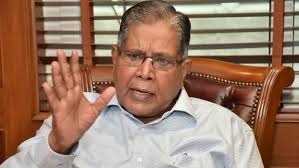India Tomorrow
NEW DELHI: Former minister Rahman Khan, in an interview with an an English fortnightly, has alleged that the new amendments in waqf laws have no justification and were intended to curtail the Muslim community’s rights.
Khan, who served as minority affairs minister during the Congress government and is known to have introduced significant changes into the waqf laws through Waqf Act of 1995, said that the amendments brought by the BJP-led NDA government did not intend to bring transparency and accountability in the waqf matters but it was an indirect attempt to seize control of the Muslim religious properties under the control of the waqf boards throughout the country. Currently, the waqf board controls around 8.7 lakh properties spread over 9.4 lakh acres across the country, making the waqf board the third largest land owner, after the Indian Railways and the Ministry of Defence.
Khan said that much of the waqf land is undeveloped, barren, and not protected. This has resulted in land grabbing by unauthorized persons. There are also disputes with the government over ownership. The waqf board also lacks a proper mechanism to remove encroachers.
He said that the condition of waqf properties in each state was highlighted in the first Joint Parliamentary Committee report in 1990. Based on this report and the findings of the Parliament Select Committee, a plan for the improvement of waqf functioning was submitted to the government in 2013. Earlier, several amendments were introduced in the Waqf Act in 1995.
He said the JPC and the Sachar Committee had recommended developing waqf properties. But the waqf department did not have funds. JPC and Sachar’s committee proposed setting up a corporation with a corpus of Rs. 500 crore for the development of waqf land. As a minister, Khan set up the National Waqf Development Corporation and it was inaugurated also in 2013.
The former minister said that he had involved several BJP members in the JPC who appreciated the work of the minority affairs ministry in this regard. BJP in its 2009 Lok Sabha election manifesto promised that it would implement the recommendations about waqf functioning if it came to power. But it abandoned the waqf work after it came to power in 2014.
The new amendments, he said, do not speak of developing the waqf properties. If the government implements the 2013 recommendations, then real progress in waqf development can be made. The new amendments are also silent on the removal of encroachment from waqf properties. The 2013 recommendations had given powers to district magistrates to remove illegal encroachments from waqf properties without following lengthy procedures.
Khan said that the current government has created an imaginary scenario that the waqf board can arbitrarily claim any land as waqf land. This has created fear in the minds of people. He clarified that the waqf board can declare any property as waqf property if the property meets the basic criteria of waqf, that is, the property has been donated for charitable purposes. And this declaration of a property as waqf property is done only after a thorough inquiry.
If someone felt aggrieved, there was a waqf tribunal to challenge the claim of the waqf board. Dedicating properties for religious purposes is nothing new. People had been dedicating their properties as waqf for centuries.
As for the appointment of women members in waqf boards and Central Waqf Council, he said that the provision of two women members in every state waqf board was introduced in the Waqf Act of 1995 itself. There is also a provision for two women members in the Central Waqf Council. This is nothing new as propagated by the BJP.
He said that there is no immediate reason for bringing two Hindu members to each of the waqf boards and the Central Waqf Council. It is aimed at portraying Muslims as communal. He said if we oppose the inclusion of non-Muslims in waqf boards, then they will say we are anti-Hindu. But will they answer why Muslims are not allowed on the management bodies of temples, gurudwars, or other religious institutions? Even a statutory body like the Tirumala Tirupati Devasthanams does not have a Muslim representative.
About representation to Aga Khanis and Bohras in Sunni waqf boards, he said that Aga Khanis and Bohras are Shia sects and they already have their separate waqf boards. There is no logic in this argument. Including specific sects like Aga Khanis and Bohras is likely to create further division in the Muslim community.
He said that replacing Survey Commissioners with district collectors would be problematic. The Survey Commissioner was independent like the election commissioner. With one Survey Commissioner, the waqf board used to deal in one place only. With dozens of collectors in each state, the waqf boards will have to deal with officials at multiple places which would increase the burden of work on waqf boards.
He also said that by deletion of the ‘waqf by user’ provision would result in thousands of land disputes. This is a violation of the Places of Worship Act 1991 which had decided that places of worship would remain as they were on August 15, 1947.
He said that the entire land of Hyderabad’s HITEC City belonged to a dargah. The state government had taken over the entire land over three years and developed the HITEC City over it. But the waqf tribunal now has declared it as waqf land. In Karnataka’s Vidya Nagar area, there are thousands of acres of land under encroachment. I had piloted a bill in Parliament for its removal.





